Setting Alerts
Rearming Alerts
Alert Action
Manage Alerts Window
Overview
An alert can be created by right-clicking within a window (such as Chart or Watch List window) and selecting Add Alert.
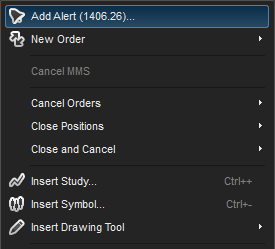
Alternatively, an alert can be created by left-clicking on Tools on the main menu and selecting Manage Alerts. When the Manage Alerts dialog box appears, click the Add button.

When the Alert dialog box appears, enter the Symbol that you want to set the alert on.
Click on the dropdown menu icon for the Alert Condition list to select the parameter which the alert will be based on: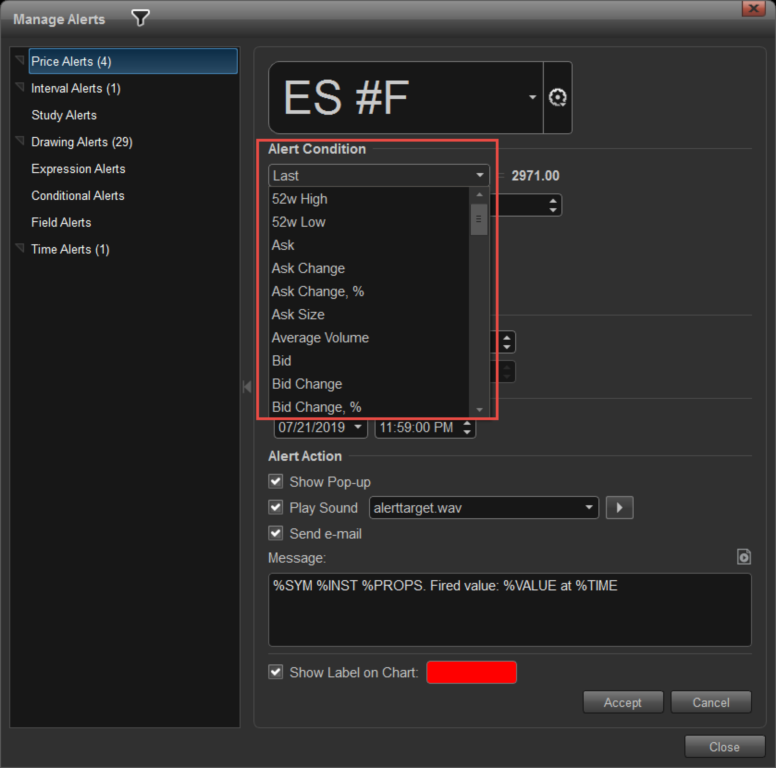
Select the value level of the alert condition: At Or Above, At Or Below, In Range, Out of Range:
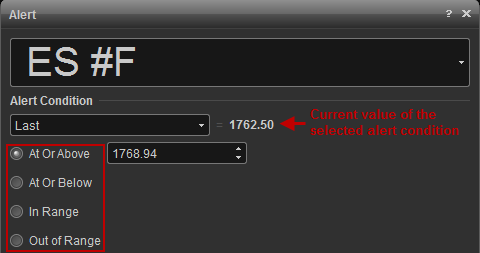
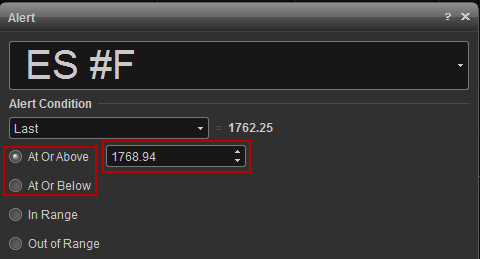
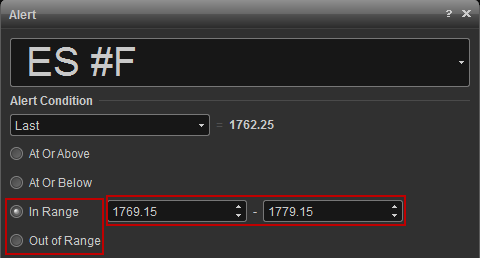
Rearming Alerts
You can automatically reset or rearm a price alert when a certain threshold is met either on a point basis or a percentage basis.
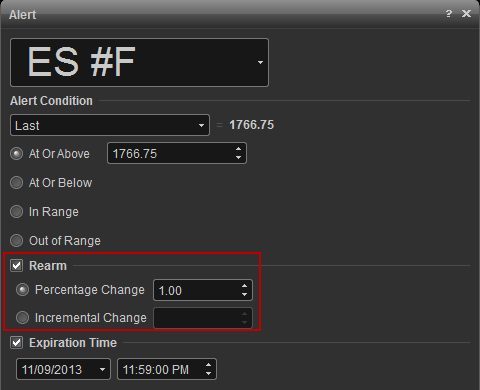
Percentage Change: Is the triggering value plus or minus the percentage change of the triggering value.
Incremental Change: Is the triggering value or plus minus the point change of the triggering value. The reverse is true for At or Below alerts.
Expiration Time: If the Rearming feature is enabled, Expiration Time is also enabled to allow to an expiration date and time to be entered for when the alert will no longer continue being rearmed.
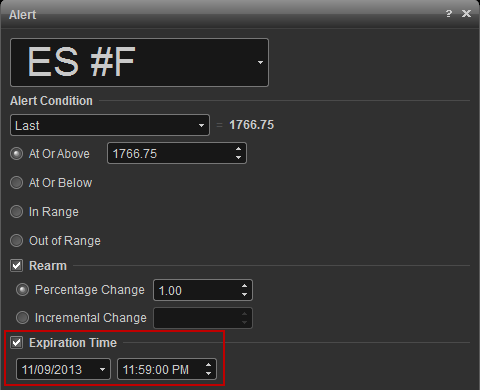
You have the option of placing a label on the chart which displaces the price level of the alert.

This label can be dragged up or down to change the price level.

Show Popup or Play Sound or Send E-mail: Select how you wish to be notified when an alert has been fired.
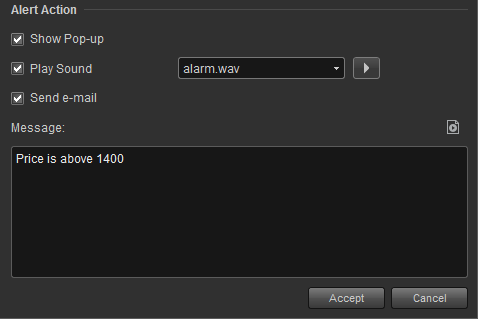
Show Popup: Enables a popup window to appear on the status bar when the alert is fired.

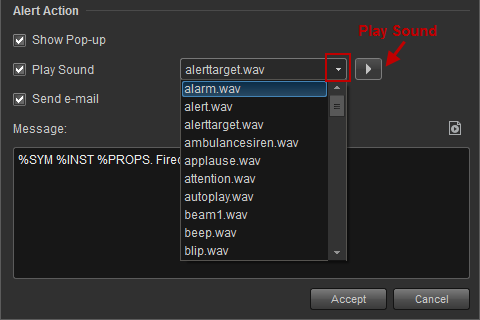
Send E-mail: Enables an e-mail to be sent to your designated mailbox when an alert is fired. To configure your e-mail account, left-click the eS icon on the menu bar, then left-click Application Properties and then E-mail:
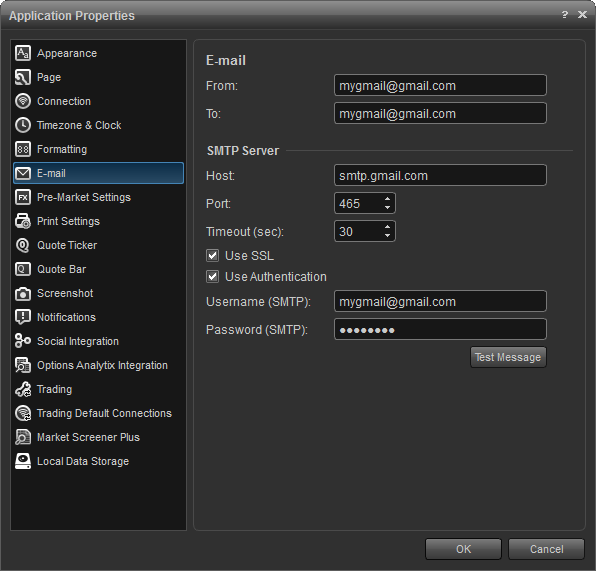
In the From box, enter the e-mail address that will be sending the message. In the To box, enter the e-mail that will be receiving the e-mail alert.
In the MTP Server Host box, you will have to enter the SMTP Outgoing Mail Server host address of the e-mail service that will be sending the e-mail. For example:
Gmail
Note: Gmail users will need to navigate to https://myaccount.google.com/) and remove the block setting for "Access for less secure apps".
Yahoo
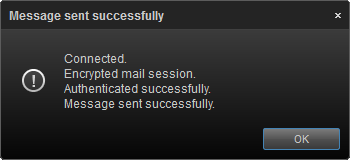
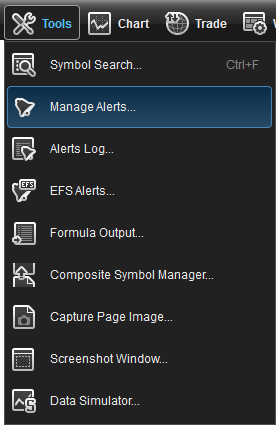
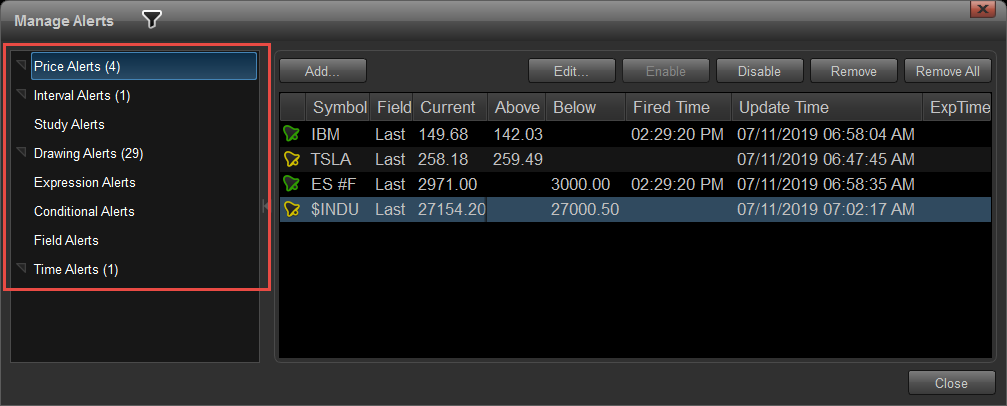
Add: Creates a new alert.
Edit: Modifies an existing alert.
Enable: Re-enables the alert after it has fired.
Disable: Deactivates the alert but leaves it on the list.
Remove: Deletes selected alert.
Remove All: Deletes all listed alerts
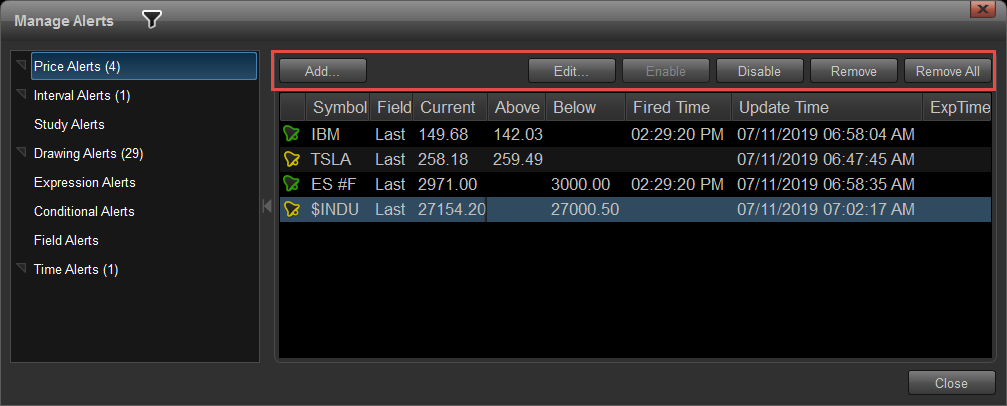
Column Fields
These fields display the details of alerts that have been created.
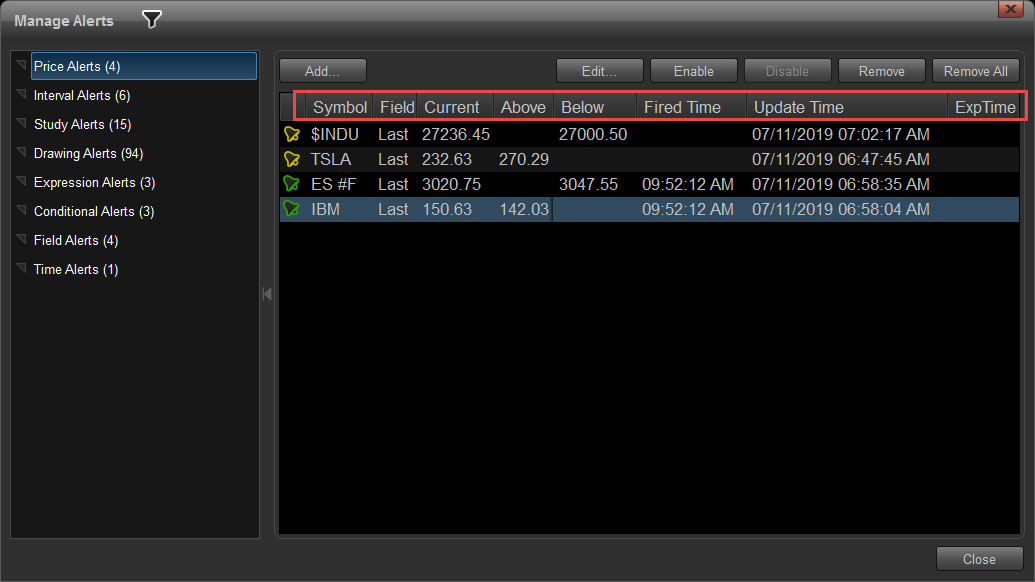
Columns can be removed by right-clicking on the column header and select or deselect the desired field.
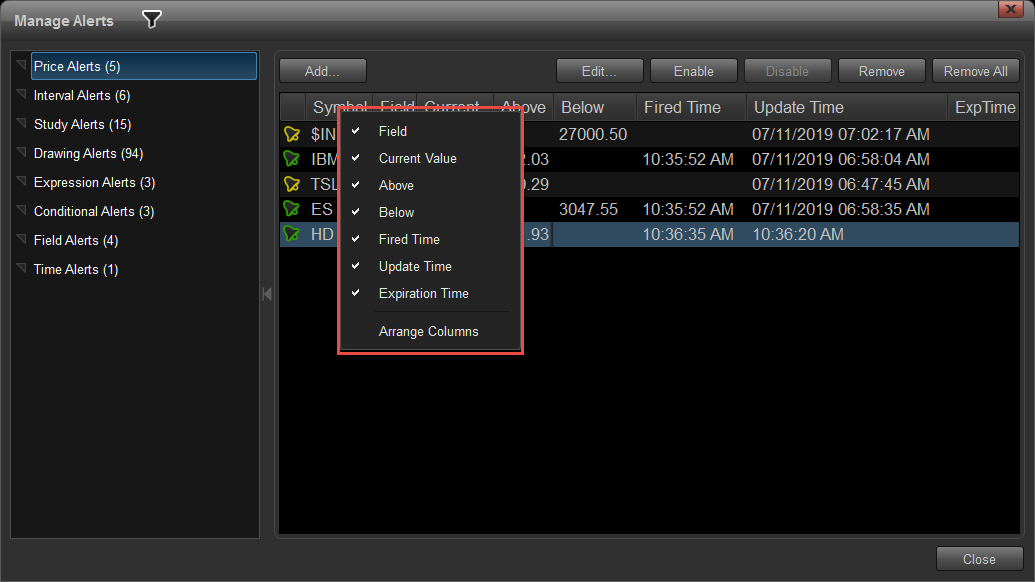
Bell icons display the status of alerts. Yellow icons are alerts that have not fired and green icons are alerts that have fired.

Interval Alerts
You can now set alerts on intervals such as time-based bars, tick bars, price range bars and volume bars in chart. You will be alerted when the bar is completed.
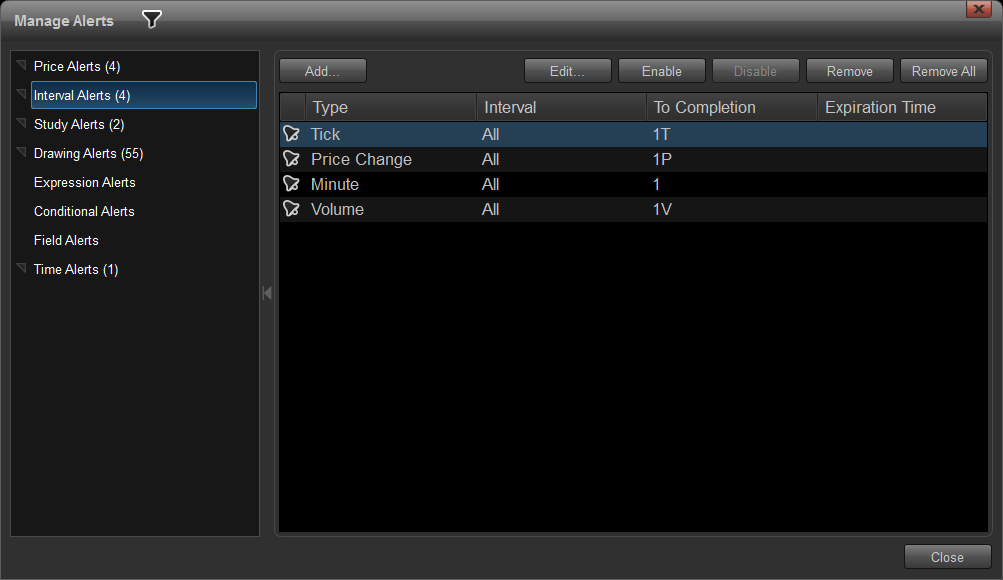
Highlighting Interval Alerts will display the dialog box which allows to select the type of Interval Alert and the Alert Action.
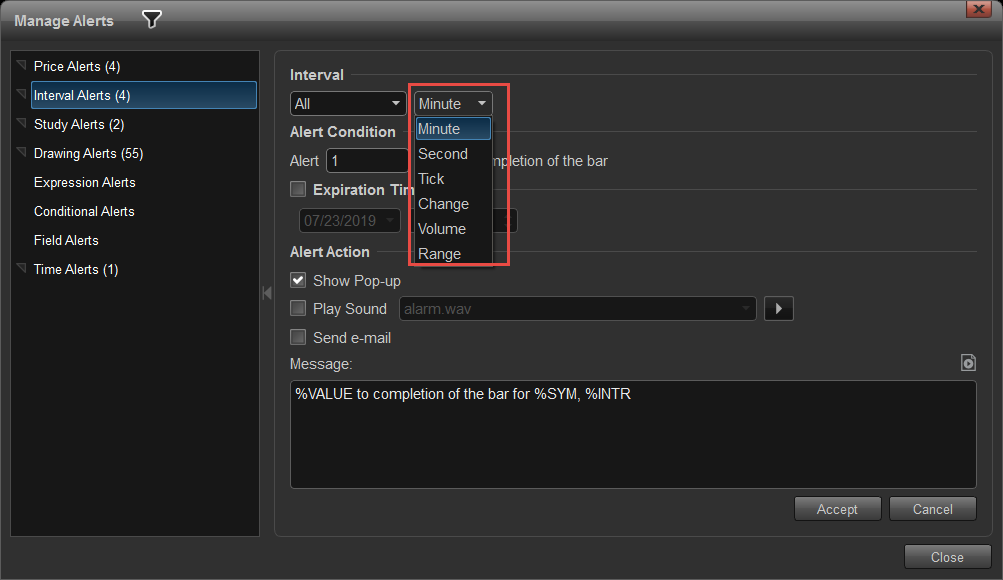
Study Alerts
Alerts can be created on Built-in Studies.

Studies can edited. Also, alerts on the selected studies can be created and edited.
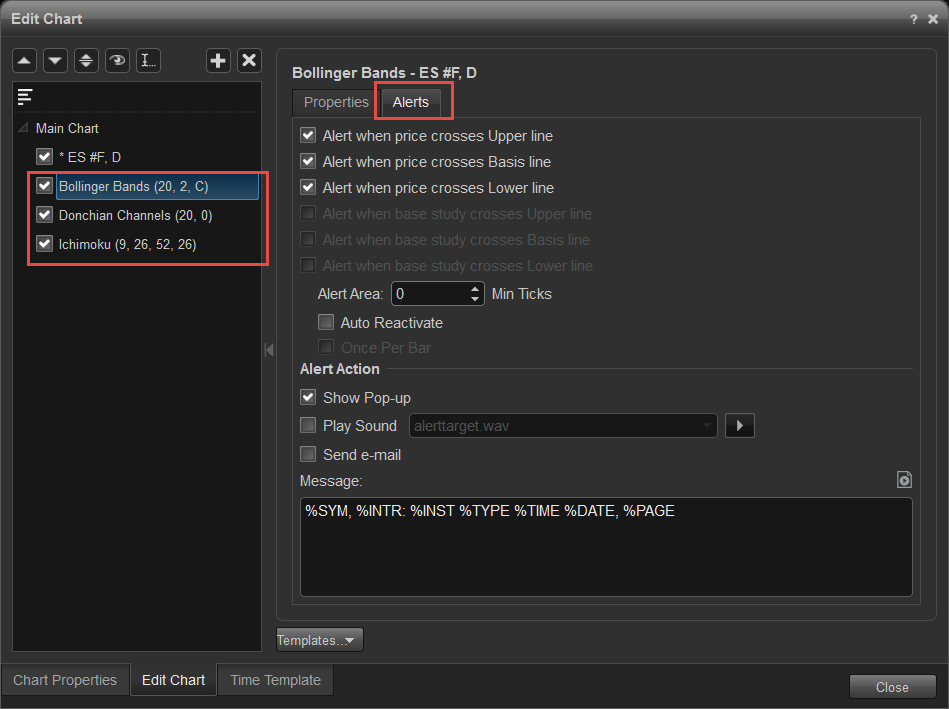
Drawing Alerts
Alerts on drawing tools on charts can be managed.

Expression Alerts
Alerts can be set on Expressions created in the Watch List.
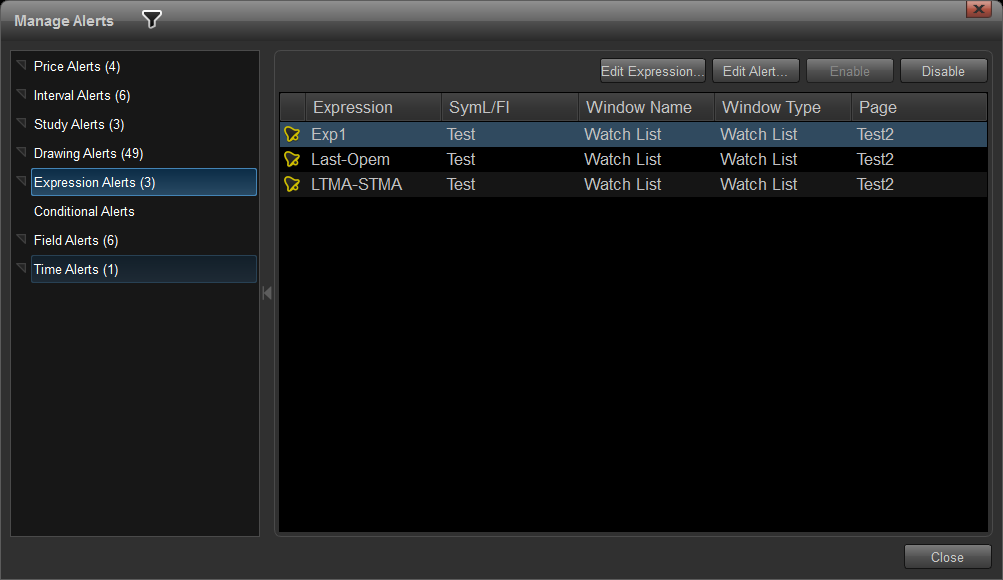
Highlight the Expression you want to create and click on the Alerts tab and select the parameters:
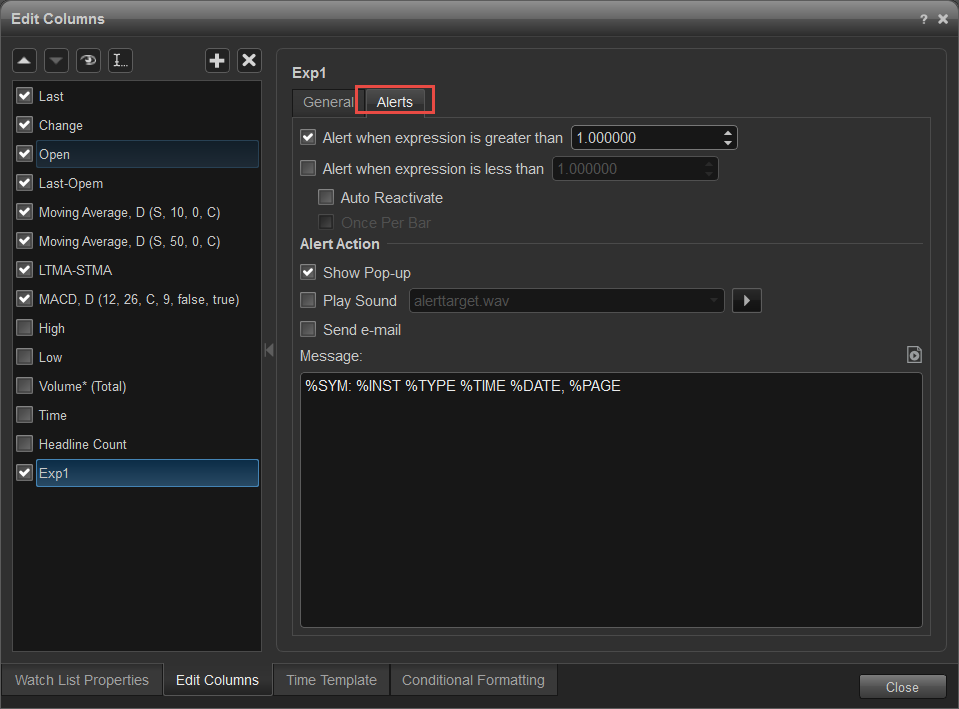
Conditional Alerts
Alerts can be set on Conditions created in the Watch List.
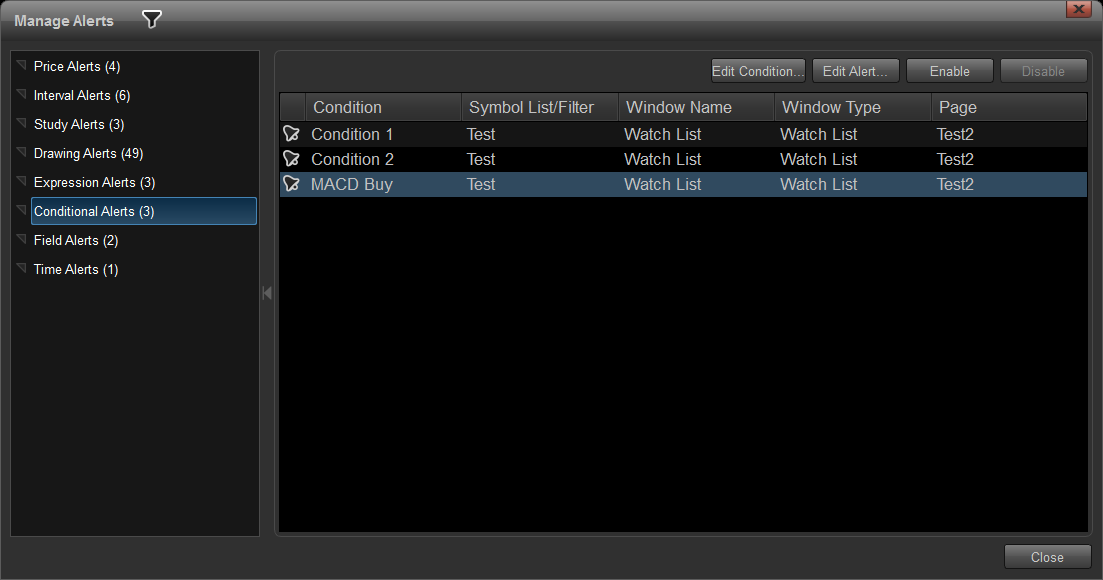
Highlight the Condition you want to create. Click on the Alerts tab and select the parameters:
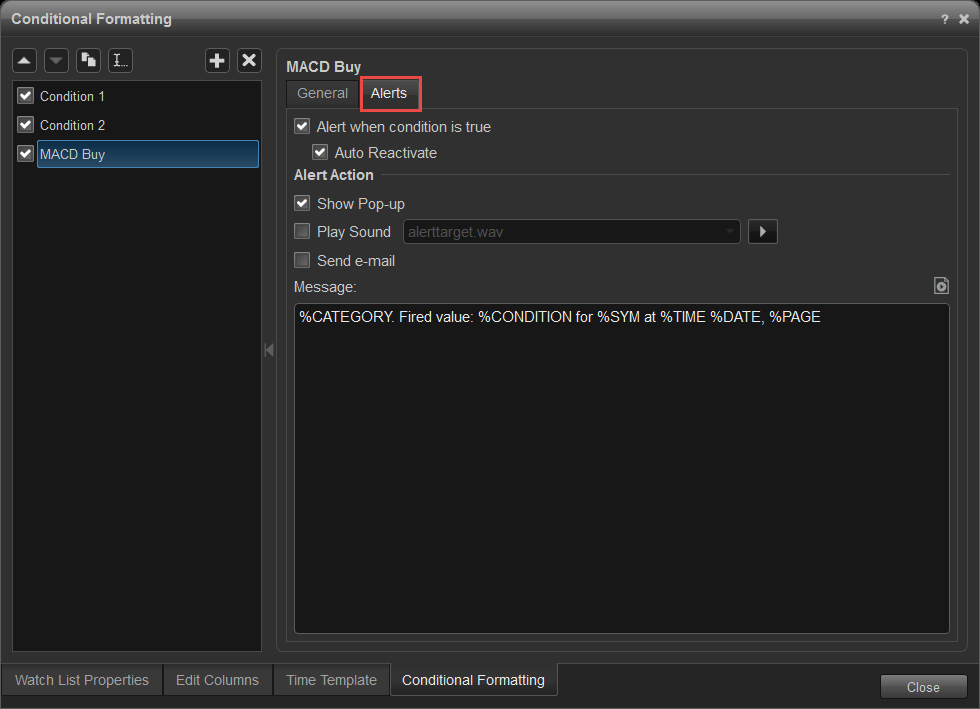
Field Alerts
You can create alerts based fields in a Watch List, such as High, Low, Last, Bid, Ask etc.
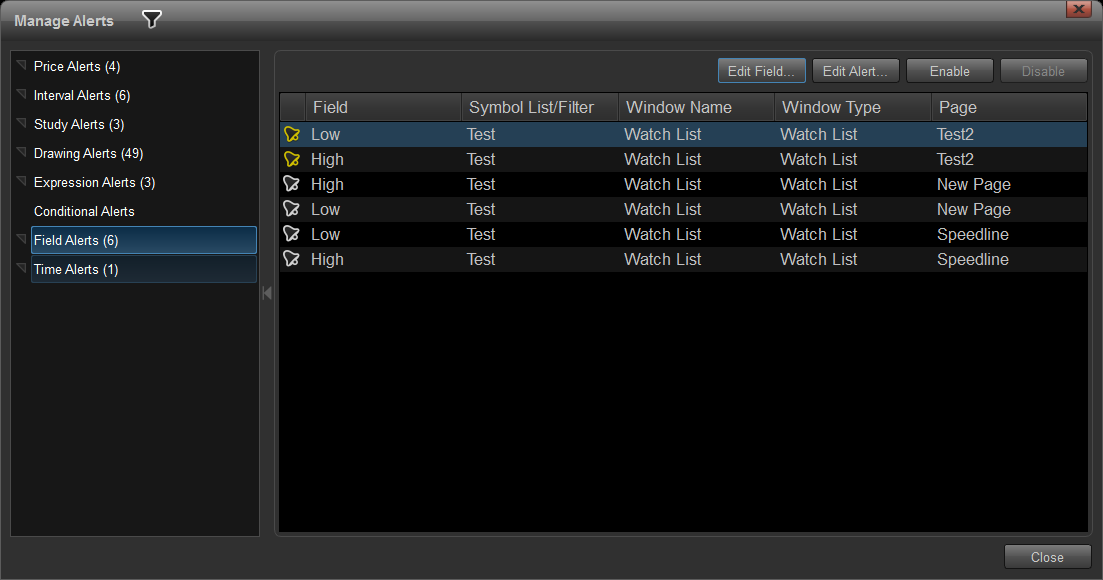
The Field Alerts dialog box allow you to select which field and how to be alerted.

Time Alerts
You can now set time alerts for different events, such as the beginning of the trading session, for example.
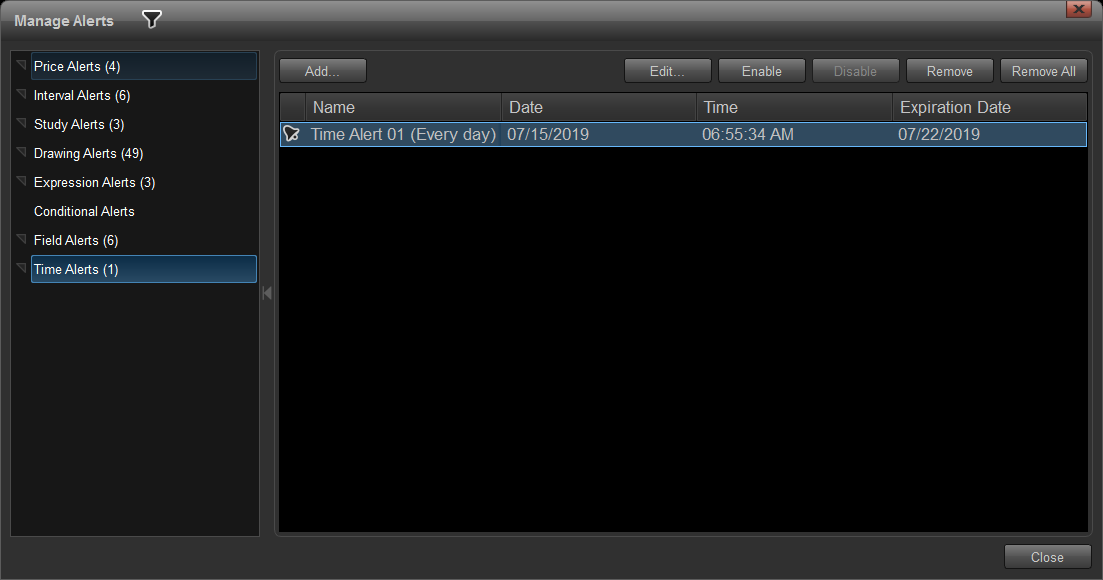
When you select Add or Edit, the Time Alert dialog box appears to enable you to set or edit the Time Alert.
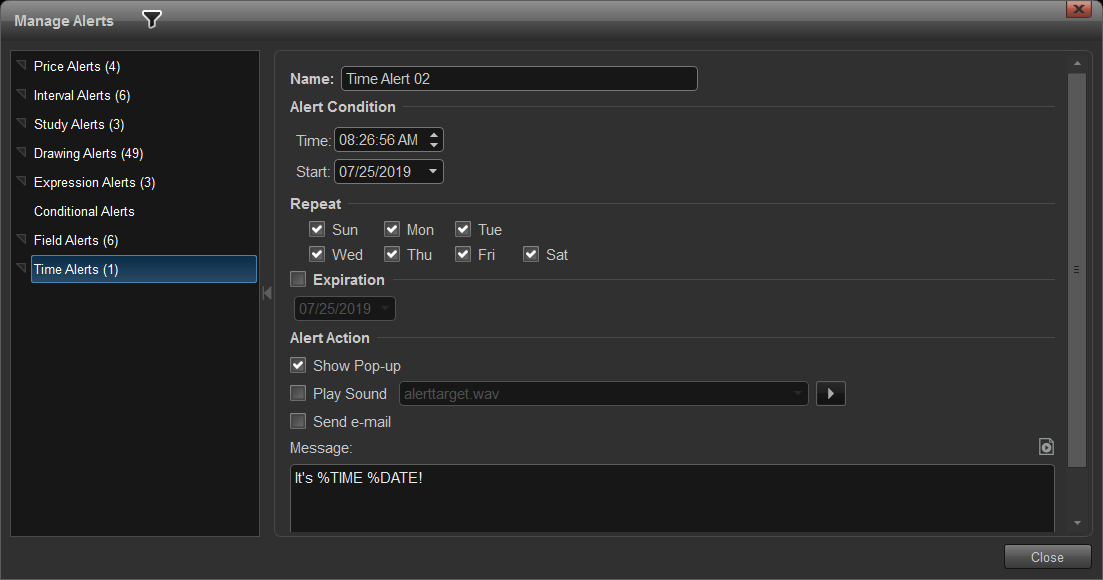
In a Watch List, when an alert is fired, the selected alert criteria will be highlighted.
Click here for information on how to set alerts on drawing tools and here on setting them on studies.
Text Alerts
If you wish to send text messages (SMS) you can do that via an email to SMS gateway. Once you have the phone number and its carrier, it is relatively easy to locate an appropriate gateway address to which you can forward your messages.
Please note that eSignal does not guarantee the exactness of the information provided here nor does it guarantee the availability and/or timeliness of any of the services, gateways, etc. directly mentioned or implied nor does it endorse any one service or solution over another.
All the information being provided in this context is "as is" to help eSignal users find the best solution.
The following instructions provide the requirements needed in order to send a text message from your email account.
Step 1: Using the email client of your choice, compose your message.
Step 2: Instead of entering an email address in the recipient box, insert the 10-digit phone number you want to reach followed by the appropriate "@gateway" address.
For example, if you want to send an SMS to the phone number (212) 555-1212 and its carrier is T-Mobile you would enter the following in the To field:
2125551212@tmomail.net
The following image illustrates how this would be set up in eSignal

The following table provides the SMS and MMS gateways for common us carriers:
|
Carrier |
SMS gateway domain |
MMS gateway domain |
|
Alltel |
[10-digit number]@message.alltel.com |
[10-digit number]@mms.alltelwireless.com |
|
AT&T |
[10-digit number]@txt.att.net |
[10-digit number]@mms.att.net |
|
Boost Mobile |
[10-digit number]@myboostmobile.com |
[10-digit number]@myboostmobile.com |
|
Cricket Wireless |
[10-digit number]@sms.cricketwireless.net |
[10-digit number]@mms.cricketwireless.net |
|
Google Project Fi |
[10-digit number]@msg.fi.google.com |
[10-digit number]@msg.fi.google.com |
|
Republic Wireless |
[10-digit number]@text.republicwireless.com |
|
|
Sprint |
[10-digit number]@messaging.sprintpcs.com |
[10-digit number]@pm.sprint.com |
|
Straight Talk |
[10-digit number]@vtext.com |
[10-digit number]@mypixmessages.com |
|
T-Mobile |
[10-digit number]@tmomail.net |
[10-digit number]@tmomail.net |
|
Ting |
[10-digit number]@message.ting.com |
|
|
Tracfone |
[10-digit number]@mmst5.tracfone.com |
|
|
U.S. Cellular |
[10-digit number]@email.uscc.net |
[10-digit number]@mms.uscc.net |
|
Verizon |
[10-digit number]@vtext.com |
[10-digit number]@vzwpix.com |
|
Virgin Mobile |
[10-digit number]@vmobl.com |
[10-digit number]@vmpix.com |
Keep in mind that if you are trying to send an email that is more than 160 characters long, it will often be sent through the Multimedia Message Service (MMS). If the number you are messaging does not have a messaging plan that includes MMS, then it will not receive the message, or it may be charged an extra fee to open the message.
Some carriers also offer email to MMS gateways — detailed in the table above — so if you wish to send a message that is more than 160 characters, use an MMS gateway instead of an SMS gateway.
More extensive lists (that may also include international carriers) can be found searching the internet.
As mentioned at the top of the above article please note that while this protocol is popular, it was not designed for messaging and as such it is not time sensitive, there can be delays in the receipt of the email depending on the routing (this does not have anything to do with the software but the design of the protocol).
If you want an alternative option for sending text messages through email, there are other web services (free and/or subscription-based) that can also be used. To find these services, run a search on the internet for "E-mail to SMS".